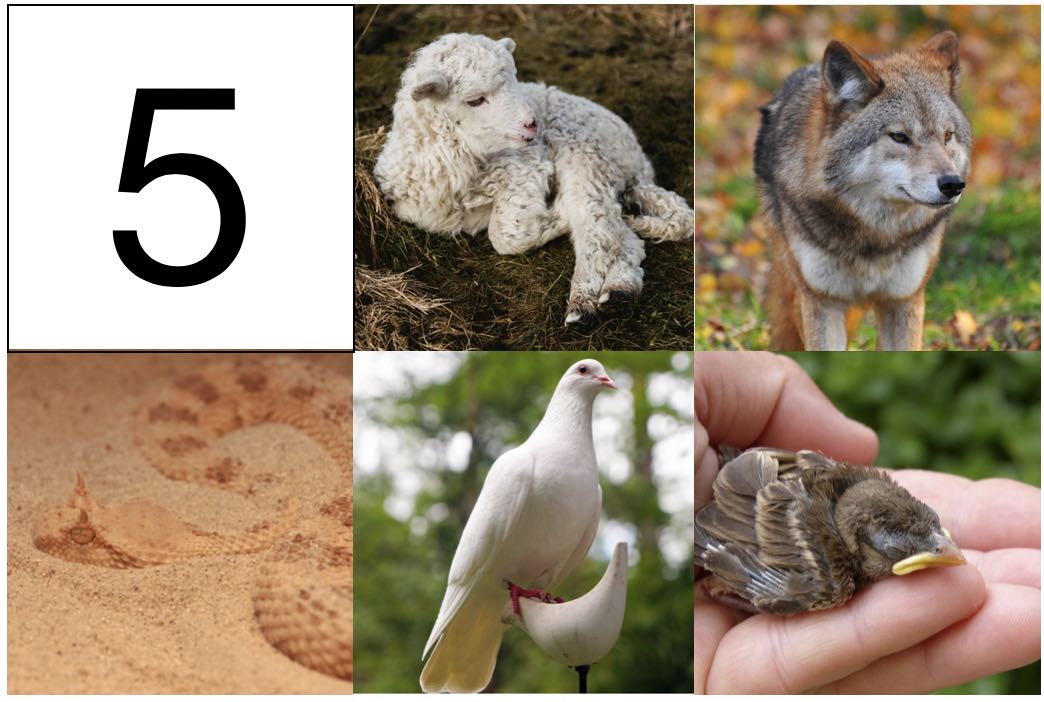The 5 Animals of Mission from Matthew 10

In Matthew 10 Jesus gives his 12 disciples instructions before he sends them out on mission. In his usual vivid style, Jesus uses 5 animals to help them and us remember key points about how to approach mission. Here are the 5 animals along with some comments about their significance.
Sheep and Wolves
Jesus said "I am sending you out like sheep among wolves".
The difference between sheep and wolves are that wolves are the predators and sheep are the potential prey. Wolves have the position of power, while sheep have the position of vulnerability. Jesus sent them on mission in the vulnerable position of sheep and he intensified this vulnerability in his command for them to go without physical resources (money, extra clothes or a staff). They would be dependent on the people they were going to.
So when Jesus sent them, and when he sends us, we need to go in vulnerability, not earthly power. We have to be particularly aware of this if we happen to be from a dominant culture or a more powerful or resource rich socio-economic group. The son of God, the prince of heaven, came in vulnerability as a baby born into a poor family who couldn't afford the normal sacrifices for new born children (Luke 2:24).
And we must avoid at all costs a predatory, targeting mentality - Jesus DOES NOT send us out as wolves among sheep.
Snakes
Jesus said "Therefore be as shrewd as snakes".
Jesus certainly wasn't telling them to be poisonous rather, as Dallas Willard in 'The Divine Conspiracy' says:
What is the wisdom of the snake? It is to be watchful and observant until the time is right to act. It is timeliness. One rarely sees a snake chasing its prey or thrashing about in an effort to impress it. But when it acts, it acts quickly and decisively.
And so when Jesus sent them, and when he sends us in vulnerability, we need to be wise and discerning about when to speak/act and when not to speak/act.
Note: This timeliness is only possible if we spend significant amounts of time with the people God sends us to. If we are only with people for five minutes, we have no ability to bide our time.
Doves
Jesus said "Be as innocent as doves"
Again Dallas Willard says:
As for the dove, it does not contrive. It is incapable of intrigue. Guile is totally beyond it...... One of the traits of the small child, greatest in the kingdom, is its inability to mislead. We are to be like that as adults.
When Jesus sent them, and when he sends us, we need to be transparent, and avoid all trickiness. When we operate in the innocence of doves we will simply be who we are and share what we know about Jesus with humility and without any attempt to manipulate or control how people respond to what we share.
Sparrows
Jesus spends a significant portion of Chapter 10 warning the disciples about the opposition they will face, opposition that could easily create fear and worry. But although Jesus sent them and Jesus sends us in vulnerability and possibly without physical resources, we DO go under the certain care of our Father, just like sparrows:
"Are not two sparrows sold for a penny? Yet not one of them will fall to the ground outside of your Father's care..... So don't be afraid you are worth more than many sparrows."
A deep appreciation of how our Father values us and cares for us will help us overcome fear of ridicule, rejection, or even worse. And I think this care also points back to Jesus earlier promise to the disciples:
"But when they arrest you, do not worry about what to say or how to say it. At that time you will be given what to say, for it will not be you speaking but the Spirit of your Father speaking through you."
So the certain care of our Father and the empowering of the Spirit can help us overcome any fear and worry associated with going on mission.
In response
I encourage you to think about sheep, wolves, snakes, doves and sparrows. Which of their lessons do you most need to hear at the moment. Ask God to show you how you might incorporate their wisdom into your engagement in local mission.
David Wanstall, 05/02/2020